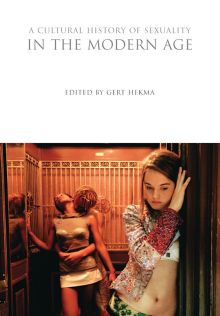Gert Hekma: Difference between revisions
The Admins (talk | contribs) No edit summary |
No edit summary |
||
| (11 intermediate revisions by 2 users not shown) | |||
| Line 1: | Line 1: | ||
[[File: | [[File:Gert Hekma library.jpg|thumb|220px|left|An elderly Gert Hekma pictured amongst his enormous book collection]]__NOTOC__{{Template:Ac}} | ||
'''Gert Hekma''' (24 September 1951 – 19 April 2022) was a Dutch anthropologist and sociologist, known for his research, publications, and public statements about (homo)sexuality, including pedophilia and sadomasochism. He taught gay and lesbian studies at the University of Amsterdam from 1984 to 2017. | '''Gert Hekma''' (24 September 1951 – 19 April 2022) was a Dutch anthropologist and sociologist, known for his research, publications, and public statements about (homo)sexuality, including pedophilia and sadomasochism. He taught gay and lesbian studies at the University of Amsterdam from 1984 to 2017. He served as editor or editorial board member of many periodicals, including ''Sexualities'' (1998-death), founded by [[Ken Plummer]], [[Paidika]]: The Journal of Paedophilia (1988-1997), ''GLQ: A Journal of Lesbian and Gay Studies'' (1993-2005) , and the ''[[Journal of Homosexuality]]'' (1985-death), ran until recently by the MAP ally psychologist [[John P. De Cecco]]. | ||
In youth, Hekma was a member of the radical "Red Faggots" (Dutch: "Rooie Flikkers"). Hekma was a prolific book collector, and had a fetish for satin. Hekma advocated against masculinity, paternalism, traditional gender roles, and for a return to sexual practice over sexual identity. | In youth, Hekma was a member of the radical "Red Faggots" (Dutch: "Rooie Flikkers"). Hekma was a prolific book collector, and had a fetish for satin. Hekma advocated against masculinity, paternalism, traditional gender roles, and for a return to sexual practice over sexual identity. | ||
| Line 6: | Line 6: | ||
==Hekma and MAP politics== | ==Hekma and MAP politics== | ||
In the book reviews section for ''Sexualities'', Hekma wrote on relevant authors including [[Bruce Rind]], historian [https://en.ua1lib.org/book/13428246/825aac Phillip Jenkins], and [[Rudiger Lautmann]]. On the Rind et al. (1998) controversy, Hekma wrote: | In the book reviews section for ''Sexualities'', Hekma wrote on relevant authors including [[Bruce Rind]], historian [https://en.ua1lib.org/book/13428246/825aac Phillip Jenkins], and [[Rudiger Lautmann]]. On the [[Rind_et_al|Rind et al. (1998) controversy]], Hekma wrote: | ||
<blockquote>''The conclusions are clear. There are victims but for most boys sex with adults does not create damage. Relations with adult women are experienced as a form of sexual initiation. Those with men are more problematic because boys will often start to feel insecure about sexual orientation and gender identity. These problems are not inherent in the relation but ''[exist]'' in a social context that abhors unmasculinity and homosexuality.'' (Book Ends, [https://doi.org/10.1177/136346000003003005 Vol. 1, No. 4, 1999, p. 505]).</blockquote> | <blockquote>''The conclusions are clear. There are victims but for most boys sex with adults does not create damage. Relations with adult women are experienced as a form of sexual initiation. Those with men are more problematic because boys will often start to feel insecure about sexual orientation and gender identity. These problems are not inherent in the relation but ''[exist]'' in a social context that abhors unmasculinity and homosexuality.'' (Book Ends, [https://doi.org/10.1177/136346000003003005 Vol. 1, No. 4, 1999, p. 505]).</blockquote> | ||
| Line 12: | Line 12: | ||
After Rind et al. was unanimously condemned (but not refuted) by the United States Congress, Hekma wrote: "''It is incredible that there was not one sane and thinking member of Congress to oppose this resolution.''" (Book Ends, [https://www.gerthekma.nl/ewExternalFiles/Book%20Ends%204.pdf?target=%20blank Volume 3, No. 3, 2000, p. 368]). | After Rind et al. was unanimously condemned (but not refuted) by the United States Congress, Hekma wrote: "''It is incredible that there was not one sane and thinking member of Congress to oppose this resolution.''" (Book Ends, [https://www.gerthekma.nl/ewExternalFiles/Book%20Ends%204.pdf?target=%20blank Volume 3, No. 3, 2000, p. 368]). | ||
Hekma wrote an obituary for [[Frits Bernard]] (died May 2006), a Dutch psychologist, sexologist, homosexual activist, and key figure of the 1st wave of the [[MAP Movement]], in ''Sexualities'' (2007, below). In an interview with Martijn for ''OK Magazine'' (2004)<ref>[https://www.brongersma.info/Interview_with_Gert_Hekma_(Gay-_%26_Lesbian_Teacher) Brongersma.info: Interview with Gert Hekma]</ref>, Hekma recalls that he had erotic dreams about Santa Claus at 6 years of age, and said of his childhood: | Hekma wrote an obituary for [[Frits Bernard]] (died May 2006), a Dutch psychologist, sexologist, homosexual activist, and key figure of the 1st wave of the [[MAP Movement]], in ''Sexualities'' (2007, below). | ||
===Media scandals=== | |||
In an interview with Martijn for ''OK Magazine'' (2004)<ref>[https://www.brongersma.info/Interview_with_Gert_Hekma_(Gay-_%26_Lesbian_Teacher) Brongersma.info: Interview with Gert Hekma]</ref>, Hekma recalls that he had erotic dreams about Santa Claus at 6 years of age, and said of his childhood: | |||
<blockquote>''I was a happy child, that is beyond dispute. But, of course, it was a life without sex though. I masturbated many, many times and extensively and played with friends in the attic. It was erotic, but not sexual. It was a repressive milieu, so in that sense I do not look back at it that positively. I think that when you look at boys and yearn for them and that you don't know that you are gay or what it is; that is terrible.''</blockquote> | <blockquote>''I was a happy child, that is beyond dispute. But, of course, it was a life without sex though. I masturbated many, many times and extensively and played with friends in the attic. It was erotic, but not sexual. It was a repressive milieu, so in that sense I do not look back at it that positively. I think that when you look at boys and yearn for them and that you don't know that you are gay or what it is; that is terrible.''</blockquote> | ||
In the same interview, | In the same interview, however, he gave controversial commentary on the [[Marquis de Sade]] and [[pedophilia]], arguing that Sade's philosophy demonstrates that pressure can be a benevolent force in sexual relations. He said: | ||
<blockquote>''Sade gives you the impression that actually people need to be forced to enjoy sexual pleasure. De Sade's small book ''Philosophie dans le boudoir'' (1795) ''[...]'' is a lesbian novel ''[...]'' about a woman who has fallen in love with a girl. This woman invites this girl to her and she is then given lessons in love by a number of gentlemen and by the woman herself. And within one day she knows then that this entire Catholic faith which she adhered to so much, and which especially her mother adhered to; that it is talking total nonsense. | <blockquote>''Sade gives you the impression that actually people need to be forced to enjoy sexual pleasure. De Sade's small book ''Philosophie dans le boudoir'' (1795) ''[...]'' is a lesbian novel ''[...]'' about a woman who has fallen in love with a girl. This woman invites this girl to her and she is then given lessons in love by a number of gentlemen and by the woman herself. And within one day she knows then that this entire Catholic faith which she adhered to so much, and which especially her mother adhered to; that it is talking total nonsense. [... T]his sexual initiation happens under a certain pressure, by both the Catholics and Sade. There is the idea that if it is about sex, no pressure may happen. That is the big problem with [[pedophilia]], because this involves unequal balances of power, and these men, they force boys to sex they do not want. As for Sade it is like''[,]'' you need to be forced a bit to learn what you like. We accept this in many, many areas. You are forced to go to school. You are forced as a child to eat your food. You are forced to crap and pee neatly at certain times. The child is being forced endlessly, but as for sex it suddenly is not allowed anymore. Sade indicates: exactly with a little pressure you learn how nice sex is.''</blockquote> | ||
In 2007, Hekma received media coverage and death threats after supporting the idea proposed by a group of adolescents, to include a canal boat for gay youth at the Amsterdam Gay Pride.<ref>[http://web.archive.org/web/20200807015936/http://www.williamapercy.com/wiki/index.php?title=Scandal_2007 Archive of Percy Wiki: 2007 Scandal]</ref> In 2014, | In 2007, Hekma received media coverage and death threats after supporting the idea proposed by a group of adolescents, to include a canal boat for gay youth at the Amsterdam Gay Pride. Hekma's discussion and response to these scandals can be found here.<ref>[http://web.archive.org/web/20200807015936/http://www.williamapercy.com/wiki/index.php?title=Scandal_2007 Archive of Percy Wiki: 2007 Scandal]</ref> In 2014, he co-created a petition addressed to the Supreme Court of the Netherlands, requesting that the Dutch Supreme Court not ban the MAP association [[Vereniging MARTIJN]]. His support of MARTIJN resulted in death threats and an attempted burglary. | ||
===Broader perspective=== | |||
Hekma was not himself a pedophile, and was in a lifelong adult-adult partnership with sociologist Mattias Duyves (b. 1953). The couple were together for more than 40 years, with Hekma meeting Duyves in 1977 and marrying in 2007. Previously, Duyves had once been a sexual partner of [[Michel Foucault]]. | |||
[[File:Gert Hekma (left) and partner Mattias, in Portugal, 1984.jpg|thumb|220px|Gert Hekma (left) and partner Mattias, in Portugal, 1984]] | |||
In a 2013 book chapter "Same Sex, Different Ages: On Pederasty in Gay History", co-authored with [[Donald Mader]] (linked in publications below), they argued that expansive child pornography law inhibits modern scholars from observing the evidence for pederastic homosexual visual culture which has been open to scholars of the early 20th century, but is now increasingly gatekept in highly restricted archives due to the risk of criminalization and destruction of archival material. This has the added consequence of "''eliminating material culture that could be evidence that “pederasts” or “pedophiles” had a culture and history''" to begin with, "''precisely the tactic that was used against colonial peoples in the nineteenth and early twentieth centuries, ''[...]'' or the tactic of Nazi Germany in its effort to destroy all remnants of Jewish culture to justify their destruction''" (p. 180). Through an extensive survey of past scholarly investigation into homosexuality, they argued that [[pederasty]] comprised the vast majority of homosexuality's recorded history: | In a 2013 book chapter "Same Sex, Different Ages: On Pederasty in Gay History", co-authored with [[Donald Mader]] (linked in publications below), they argued that expansive child pornography law inhibits modern scholars from observing the evidence for pederastic homosexual visual culture which has been open to scholars of the early 20th century, but is now increasingly gatekept in highly restricted archives due to the risk of criminalization and destruction of archival material. This has the added consequence of "''eliminating material culture that could be evidence that “pederasts” or “pedophiles” had a culture and history''" to begin with, "''precisely the tactic that was used against colonial peoples in the nineteenth and early twentieth centuries, ''[...]'' or the tactic of Nazi Germany in its effort to destroy all remnants of Jewish culture to justify their destruction''" (p. 180). Through an extensive survey of past scholarly investigation into homosexuality, they argued that [[pederasty]] comprised the vast majority of homosexuality's recorded history: | ||
| Line 28: | Line 37: | ||
In a 2014 conference paper available to watch on YouTube (external link below), later published as "Kinderen, seks en zelfbepaling" [En: Children, sex and self-determination] - read in his absence by [[Thomas Hubbard]] - Hekma gave a historical overview of Dutch movements around pedophilia and pederasty. He proposes explanations for "the surprising demonization of pedophilia". | In a 2014 conference paper available to watch on YouTube (external link below), later published as "Kinderen, seks en zelfbepaling" [En: Children, sex and self-determination] - read in his absence by [[Thomas Hubbard]] - Hekma gave a historical overview of Dutch movements around pedophilia and pederasty. He proposes explanations for "the surprising demonization of pedophilia". | ||
==External | Hekma was PhD supervisor to Rachel Mosbacher, whose thesis was titled ''A Generation Silenced: The Role of Children as Seen Through the Discourse on Age of Consent Legislation'' (2007).<ref>[https://www.ipce.info/library/thesis/generation-silenced-role-children-seen-throug A Generation Silenced (IPCE, external link)]</ref> | ||
==External links== | |||
*[https://youtu.be/4zF6xwIlEoI?t=2159 Children, sex and self-determination] - Read (from 36.00) by [[Thomas Hubbard]]. | *[https://youtu.be/4zF6xwIlEoI?t=2159 Children, sex and self-determination] - Read (from 36.00) by [[Thomas Hubbard]]. | ||
*[https://web.archive.org/web/20220420042651/https://marthijn.nl/p/231 Gert Hekma Overleden] - In Dutch by [[Marthijn Uittenbogaard]]. | |||
==Selected Publications== | ==Selected Publications== | ||
[[File:Hekma sexuality book cover.jpg|thumb|220px|''A Cultural History of Sexuality in the Modern Age'' (2014), edited by Gert Hekma]] | |||
*[https://www.gerthekma.nl/ewExternalFiles/Wrong%20lovers%20in%2019th-century%20Netherlands.pdf?target=_blank Wrong lovers in 19th-century Netherlands], in: [[''Journal of Homosexuality'']] 13:2-3 (1987), pp. 43-54 (Also in the book: A.X. van Naerssen (ed), ''Gay life in Dutch society'' (New York: Harrington Press, 1987). | *[https://www.gerthekma.nl/ewExternalFiles/Wrong%20lovers%20in%2019th-century%20Netherlands.pdf?target=_blank Wrong lovers in 19th-century Netherlands], in: [[''Journal of Homosexuality'']] 13:2-3 (1987), pp. 43-54 (Also in the book: A.X. van Naerssen (ed), ''Gay life in Dutch society'' (New York: Harrington Press, 1987). | ||
*[https://www.gerthekma.nl/ewExternalFiles/Sodomites%20Platonic%20Lovers%201989.pdf?target=_blank Sodomites, platonic lovers, wrong lovers. The backgrounds of the modern homosexual], in ''Journal of Homosexuality'' 16:1/2 (1988/89); also in Kent Gerard & Gert Hekma (eds), ''The Pursuit of Sodomy: Male Homosexuality in Renaissance and Enlightenment Europe'' (New York 1989, pp. 433-455). | *[https://www.gerthekma.nl/ewExternalFiles/Sodomites%20Platonic%20Lovers%201989.pdf?target=_blank Sodomites, platonic lovers, wrong lovers. The backgrounds of the modern homosexual], in ''Journal of Homosexuality'' 16:1/2 (1988/89); also in Kent Gerard & Gert Hekma (eds), ''The Pursuit of Sodomy: Male Homosexuality in Renaissance and Enlightenment Europe'' (New York 1989, pp. 433-455). | ||
Latest revision as of 03:52, 21 September 2023

Gert Hekma (24 September 1951 – 19 April 2022) was a Dutch anthropologist and sociologist, known for his research, publications, and public statements about (homo)sexuality, including pedophilia and sadomasochism. He taught gay and lesbian studies at the University of Amsterdam from 1984 to 2017. He served as editor or editorial board member of many periodicals, including Sexualities (1998-death), founded by Ken Plummer, Paidika: The Journal of Paedophilia (1988-1997), GLQ: A Journal of Lesbian and Gay Studies (1993-2005) , and the Journal of Homosexuality (1985-death), ran until recently by the MAP ally psychologist John P. De Cecco.
In youth, Hekma was a member of the radical "Red Faggots" (Dutch: "Rooie Flikkers"). Hekma was a prolific book collector, and had a fetish for satin. Hekma advocated against masculinity, paternalism, traditional gender roles, and for a return to sexual practice over sexual identity.
Hekma and MAP politics
In the book reviews section for Sexualities, Hekma wrote on relevant authors including Bruce Rind, historian Phillip Jenkins, and Rudiger Lautmann. On the Rind et al. (1998) controversy, Hekma wrote:
The conclusions are clear. There are victims but for most boys sex with adults does not create damage. Relations with adult women are experienced as a form of sexual initiation. Those with men are more problematic because boys will often start to feel insecure about sexual orientation and gender identity. These problems are not inherent in the relation but [exist] in a social context that abhors unmasculinity and homosexuality. (Book Ends, Vol. 1, No. 4, 1999, p. 505).
After Rind et al. was unanimously condemned (but not refuted) by the United States Congress, Hekma wrote: "It is incredible that there was not one sane and thinking member of Congress to oppose this resolution." (Book Ends, Volume 3, No. 3, 2000, p. 368).
Hekma wrote an obituary for Frits Bernard (died May 2006), a Dutch psychologist, sexologist, homosexual activist, and key figure of the 1st wave of the MAP Movement, in Sexualities (2007, below).
Media scandals
In an interview with Martijn for OK Magazine (2004)[1], Hekma recalls that he had erotic dreams about Santa Claus at 6 years of age, and said of his childhood:
I was a happy child, that is beyond dispute. But, of course, it was a life without sex though. I masturbated many, many times and extensively and played with friends in the attic. It was erotic, but not sexual. It was a repressive milieu, so in that sense I do not look back at it that positively. I think that when you look at boys and yearn for them and that you don't know that you are gay or what it is; that is terrible.
In the same interview, however, he gave controversial commentary on the Marquis de Sade and pedophilia, arguing that Sade's philosophy demonstrates that pressure can be a benevolent force in sexual relations. He said:
Sade gives you the impression that actually people need to be forced to enjoy sexual pleasure. De Sade's small book Philosophie dans le boudoir (1795) [...] is a lesbian novel [...] about a woman who has fallen in love with a girl. This woman invites this girl to her and she is then given lessons in love by a number of gentlemen and by the woman herself. And within one day she knows then that this entire Catholic faith which she adhered to so much, and which especially her mother adhered to; that it is talking total nonsense. [... T]his sexual initiation happens under a certain pressure, by both the Catholics and Sade. There is the idea that if it is about sex, no pressure may happen. That is the big problem with pedophilia, because this involves unequal balances of power, and these men, they force boys to sex they do not want. As for Sade it is like[,] you need to be forced a bit to learn what you like. We accept this in many, many areas. You are forced to go to school. You are forced as a child to eat your food. You are forced to crap and pee neatly at certain times. The child is being forced endlessly, but as for sex it suddenly is not allowed anymore. Sade indicates: exactly with a little pressure you learn how nice sex is.
In 2007, Hekma received media coverage and death threats after supporting the idea proposed by a group of adolescents, to include a canal boat for gay youth at the Amsterdam Gay Pride. Hekma's discussion and response to these scandals can be found here.[2] In 2014, he co-created a petition addressed to the Supreme Court of the Netherlands, requesting that the Dutch Supreme Court not ban the MAP association Vereniging MARTIJN. His support of MARTIJN resulted in death threats and an attempted burglary.
Broader perspective
Hekma was not himself a pedophile, and was in a lifelong adult-adult partnership with sociologist Mattias Duyves (b. 1953). The couple were together for more than 40 years, with Hekma meeting Duyves in 1977 and marrying in 2007. Previously, Duyves had once been a sexual partner of Michel Foucault.

In a 2013 book chapter "Same Sex, Different Ages: On Pederasty in Gay History", co-authored with Donald Mader (linked in publications below), they argued that expansive child pornography law inhibits modern scholars from observing the evidence for pederastic homosexual visual culture which has been open to scholars of the early 20th century, but is now increasingly gatekept in highly restricted archives due to the risk of criminalization and destruction of archival material. This has the added consequence of "eliminating material culture that could be evidence that “pederasts” or “pedophiles” had a culture and history" to begin with, "precisely the tactic that was used against colonial peoples in the nineteenth and early twentieth centuries, [...] or the tactic of Nazi Germany in its effort to destroy all remnants of Jewish culture to justify their destruction" (p. 180). Through an extensive survey of past scholarly investigation into homosexuality, they argued that pederasty comprised the vast majority of homosexuality's recorded history:
Nowhere in this alphabet soup is there a P for Pederasts — who, on the basis of our survey, have as much right if not more to be part of it. We are well aware that discourses create realities — or rather, rearrange them, making them comprehensible — and that it is the perfect prerogative of the LGBTTTQQI to define (homo)sexuality in terms of equal and symmetrical relations only. But there is a certain dialectic here: discourses can change realities by reshaping their dynamics, but they cannot create them out of the whole cloth. The history of pederasty is to a large extent the history of homosexuality, and vice versa [... and] desire that transcends age differences remains stubbornly alive in the LGBT community. [e.g. age-play and legal age-disparate sex - Newgon] (p. 187).
In a 2014 conference paper available to watch on YouTube (external link below), later published as "Kinderen, seks en zelfbepaling" [En: Children, sex and self-determination] - read in his absence by Thomas Hubbard - Hekma gave a historical overview of Dutch movements around pedophilia and pederasty. He proposes explanations for "the surprising demonization of pedophilia".
Hekma was PhD supervisor to Rachel Mosbacher, whose thesis was titled A Generation Silenced: The Role of Children as Seen Through the Discourse on Age of Consent Legislation (2007).[3]
External links
- Children, sex and self-determination - Read (from 36.00) by Thomas Hubbard.
- Gert Hekma Overleden - In Dutch by Marthijn Uittenbogaard.
Selected Publications

- Wrong lovers in 19th-century Netherlands, in: ''Journal of Homosexuality'' 13:2-3 (1987), pp. 43-54 (Also in the book: A.X. van Naerssen (ed), Gay life in Dutch society (New York: Harrington Press, 1987).
- Sodomites, platonic lovers, wrong lovers. The backgrounds of the modern homosexual, in Journal of Homosexuality 16:1/2 (1988/89); also in Kent Gerard & Gert Hekma (eds), The Pursuit of Sodomy: Male Homosexuality in Renaissance and Enlightenment Europe (New York 1989, pp. 433-455).
- Rewriting the history of Sade, in: Journal of the History of Sexuality 1:1 (July 1990), pp. 131-136.
- "A Female Soul in a Male Body": Sexual Inversion as Gender Inversion in Nineteenth-Century Sexology, in: Gilbert Herdt (ed), Third Sex, Third Gender: Beyond Sexual Dimorphism in Culture and History (New York: Zone Books, 1994).
- Sexual Minority Rights in Europe
- Queering Anthropology, in: Jan Willem Duyvendak, Theo Sandfort, Judith Schuyf & Jeffrey Weeks (eds), Lesbian and Gay Studies (London: Sage, 2000), pp. 81-97.
- The decline of sexual radicalism in the Netherlands (in English, published in Gert Hekma (ed) Past and Present of Radical Sexual Politics (Amsterdam: Mosse Foundation, 2004).
- Queer: The Dutch case, in: GLQ 10:2 (2004), pp. 276-280.
- Obituary: Frits Bernard (28 August 1920–23 May 2006), in Sexualities, 10:1 (February 2007), pp. 127-128.
- Pro-Gay and Anti-Sex. Sexual Politics at a Turning Point in The Netherlands (2008)
- ‘The Drive for Sexual Equality’, in: Sexualities 11:1 (2008), 51-55.
- Gert Hekma & Jan Willem Duyvendak, ‘The Netherlands: Depoliticization of Homosexuality and Homosexualization of Politics’. In: Manon Tremblay, David Paternotte & Carol Johnson (eds), The Lesbian and Gay Movement and the State (Farnham: Ashgate, 2011), pp. 103-118.
- Gert Hekma and Jan Willem Duyvendak, Queer Netherlands: A puzzling example, in Sexualities, 14:6 (2011), pp. 625–631 (see p. 628 - Newgon).
- D.H. Mader and Gert Hekma, "Same Sex, Different Ages: On Pederasty in Gay History", in Censoring Sex Research: The Debate Over Male Intergenerational Relationships, ed. by Thomas K. Hubbard and Beert Verstraete (Walnut Creek, CA: Left Coast Press, 2013), pp. 161-193.
- Kinderen, seks en zelfbepaling: Praten over pedofilie [EN: Children, sex and self-determination Talking about pedophilia], in Sociologie, 9:3-4 (2013), pp. 276-293.
- Jacob Israël de Haan: Pederast poet between Amsterdam and Jerusalem, in: Florian Mildenberger (ed), Die andere Fakultät. Theorie, Geschichte, Gesellschaft (Hamburg: Männerschwarm Verlag, 2015), pp. 90-110.
- The relevance of Sade for society today, in: Gert Hekma & Lode Lauwaert (eds), De Sade Symposia, in: Journal of the International Network of Sexual Ethics and Politics 3:1, (2015), 5-6.
- Tony Duvert: The sad ending of a promising writer. Gay News (Dutch and English magazine), No. 307; March 2017.
Notes
- Official Encyclopedia
- Gay
- Sociological Theory
- Research
- Research on Minor Attraction
- Research on "Child Molesters"
- Research into effects on Children
- Research: Broader Perspectives
- People
- People: Dutch
- People: Deceased
- People: Academics
- People: Critical Analysts
- People: Sympathetic Activists
- People: Popular Authors
